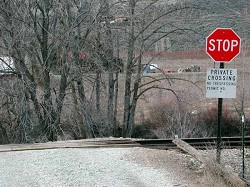

A private railroad crossing on the Cascade and Columbia River Railroad which is a short-line that moves goods between Wenatchee and Oroville. There are approximately 170 private crossings leased from the railroad along the line.
OKANOGAN COUNTY – The fees to use private railroad crossings on the Cascade and Columbia River Railroad (CSCD) have gone up recently upsetting some local residents.
“We’ve been down here since 1986 and we’ve basically had a lease agreement that for years was about $25 a year and then it slowly increased until 10 years ago it became $250,” Robert Bergh from Tonasket said. “This year, they wanted $2,800. Our contract came up in July and at that time they notified us that they were going to increase each crossing to $500 and the railway to $1,200. They also said they wanted a five percent yearly increase and better liability insurance.”
RailAmerica’s CSCD is a short-line railroad that moves goods from Wenatchee to Oroville. There are approximately 170 private crossings on the 137-miles of track which are used by both private people and businesses. Ken Charron, spokesman for CSCD, said this is the largest number of crossings he’s seen on any line and that some of these crossings are within a few hundred feet of each other. He said the reason for the fee increase is to standardize fees for the company.
“The fee increase is to get the fees to be the same as what people normally pay around the country,” Charron said. “We did market research and hired a consultant to decide what the value of the use of the land was. The fee is now $500 per person, per crossing.”
One of the businesses that use the CSCD private crossings is the Oroville-Tonasket Irrigation District. District Manager Tom Scott said the irrigation district has three crossings they use.
“We have a pumping plant that serves the Bonaparte-Tonasket area, another near Ellisford and the third crossing serves the area from Ellisford to about two miles from Oroville,” Scott said. “We had to apply for a permit to get the Ellisforde crossing rebuilt and the application fee was $1,000.”
Bergh said that he and his wife formed the Citizens Railroad Coalition Committee (CRCC) to fight the fee increases and that there are currently 40 active members.
“We’ve heard about the coalition and what we know is that over 90 percent of those crossings are being paid and the coalition is only about ten percent of the crossings,” Charron said. “We want to work with people to see how the fees can be paid but we’re private property and we have the right to increase fees.”
Charron said another reason for the fee increase is the liability the CSCD is under when there is an accident.
“You are 46 percent more likely to die with an accident involving a train than with a car and people always look at the railroad when that happens,” he said. “Unfortunately, people who use these crossings every day get used to the bump and forget what they’re driving over and we can’t be held responsible for every person crossing.”
Despite these reasons for the increase, Bergh and the CRCC feel that the fees are too high.
“We felt they made the fee high enough to make it prohibitive to live here and also prohibitive to sell our home,” Bergh added. “We’re fighting by not paying and we’ve received late notices. They’re trying to charge us interest and are threatening to rip up our crossings. We know other people who have received similar threats, but we’ve let them know that we’ve received legal council advising us that they can’t legally do that and if they do, we’ll see them in court.”
Scott that the fee increase will cut into the budget of the irrigation district.
“If they’re talking $500 per year with the ability to raise five percent a year, that’s going to become an issue,” Scott said. “We can absorb it right now, but it’s going to be a problem down the road. I don’t think anyone wants anything for free, but they want something reasonable.”
Charron said that there is never any good time to raise prices, but that this is something CSCD needs to do and hasn’t done for a decade.
According to a statement from CSCD “CSCD conducted a reassessment of the contracts and learned that existing rates did not reflect the true value of using the property and CSCD’s costs of doing business. The railroad held rates steady for many years, enabling residents to pay artificially low rates for the convenience and accessibility offered by the private crossings. As the rates were held steady, new crossing came about, and thus some people pay fees that are different than fees paid by others.”
“We’d like to try to work with people for alternative ways, not to pay for the crossings, but to use the crossings,” he said. “There are a lot of crossings that can be closed because they’re there for convenience; such as three crossings to get to the same property, so one way to help is to close two. What I would like to see is for nearby crossings with two owners to share one crossing because there’s a benefit to us for closing crossings; it’s safer for us.”





